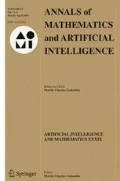Abstract
We propose an extension of primal grammars (Hermann and Galbavý, Theor Comp Sci 176(1–2):111–158, 1997), called P-grammars. Primal grammars are term grammars with a high expressive power and good computational properties. P-grammars have exactly the same properties but are more modular, more concise, and easier to use, as shown by some examples. We prove that P-grammars are exponentially more concise than primal grammars. An algorithm, called p2primal, transforming any P-grammar into an equivalent primal grammar is provided, thus making the original formalism much easier to handle from a practical point of view.
Similar content being viewed by others
References
Amaniss, A., Hermann, M., Lugiez, D.: Etude comparative des méthodes de schématisation de séquences infinies de termes du premier ordre. Research Report 93-R-114, Centre de Recherche en Informatique de Nancy (1993)
Aravantinos, V.: Schémas de preuves et de formules: vers plus de structure et d’efficacité en déduction automatique. Master thesis, Institut National Polytechnique de Grenoble & Université Joseph Fourier (2007). http://membres-lig.imag.fr/aravantinos
Aravantinos, V., Caferra, R., Peltier, N.: A schemata calculus for propositional logic. In: Giese, M., Waaler, A. (eds.) TABLEAUX. Lecture Notes in Computer Science, vol. 5607, pp. 32–46. Springer (2009)
Bensaid, H., Caferra, R., Peltier, N.: Dei: a theorem prover for terms with integer exponents. In: Schmidt, R.A. (ed.) CADE. Lecture Notes in Computer Science, vol. 5663, pp. 146–150. Springer (2009)
Bensaid, H., Caferra, R., Peltier, N.: Perfect discrimination graphs: indexing terms with integer exponents. In: Giesl, J., Hähnle, R. (eds.) International Joint Conference on Automated Reasoning. Lecture Notes in Computer Science. Springer (2010, to appear)
Chen, H., Hsiang, J., Kong, H.: On finite representations of infinite sequences of terms. In: Conditional and Typed Rewriting Systems. LNCS 516, pp. 100–114. Springer (1990)
Comon, H.: On unification of terms with integer exponents. Math. Syst. Theory 28, 67–88 (1995)
Comon, H., Dauchet, M., Gilleron, R., Jacquemard, F., Lugiez, D., Tison, S., Tommasi, M.: Tree automata techniques and applications. http://www.grappa.univ-lille3.fr/tata (2005). Release 12 October 2007
Hermann, M.: Divergence des systèmes de réécriture et schématisation des ensembles infinis de termes. Habilitation, Université Henri Poincaré Nancy 1 (1994)
Hermann, M.: Overview of existing recurrent schematizations. In: Proc. of the CADE-13 Workshop on Term Schematization and their Applications (1996)
Hermann, M., Galbavý, R.: Unification of infinite sets of terms schematized by primal grammars. Theor. Comp. Sci. 176(1–2), 111–158 (1997)
Peltier, N.: The first order theory of primal grammars is decidable. Theor. Comp. Sci. 323, 267–320
Salzer, G.: The unification of infinite sets of terms and its applications. In: Logic Programming and Automated Reasoning (LPAR’92). LNAI 624, pp. 409–429. Springer (1992)
Author information
Authors and Affiliations
Corresponding author
Rights and permissions
About this article
Cite this article
Aravantinos, V., Caferra, R. & Peltier, N. Simplified handling of iterated term schemata. Ann Math Artif Intell 58, 155–183 (2010). https://doi.org/10.1007/s10472-010-9200-3
Published:
Issue Date:
DOI: https://doi.org/10.1007/s10472-010-9200-3



